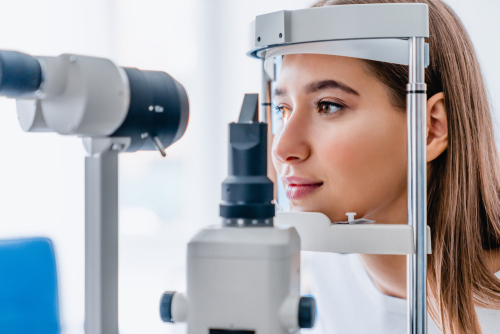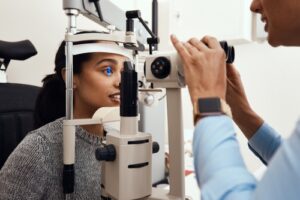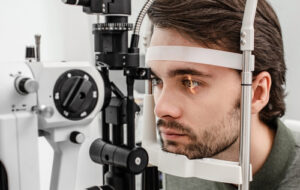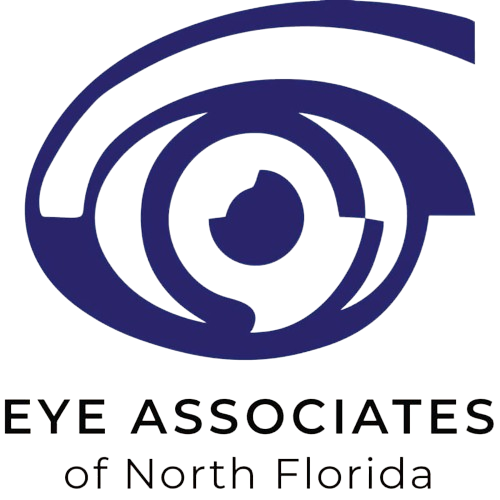Can I Get Cataracts in My Thirties?

Cataracts are extremely common and are the leading cause of blindness worldwide. Because they are typically age-related, everyone will experience a cataract at some point in their life.
Cataracts can also develop earlier in life due to other reasons. Whether you’re in your thirties or any stage of life, understanding cataracts and their potential impact is crucial.
Keep reading to find out if you can get cataracts in your thirties!
What Are Cataracts?

A cataract is a clouding of your eye’s lens. The lens is a normally transparent structure that lies behind the iris and pupil.
When light enters your eye, it goes through your lens. The lens then bends the light to help it land on the back part of your eye, called the retina.
The retina is a layer of tissue at the back of the eye that sends information to the brain for processing. In a healthy eye, the transparency of the lens allows light to pass right through.
A cataract obstructs this passage, preventing light from focusing. Instead, it scatters the light.
As a result, those with cataracts can experience various vision problems, including blurred vision.
What Are the Symptoms of Cataracts?
Cataract symptoms can vary from person to person and typically also depend on the severity of the cataract. Symptoms of a cataract include:
- Blurry or cloudy vision
- Glare or light sensitivity
- Reduced color vibrancy
- The need for stronger light during activities like reading
- Difficulty seeing at night
- Double vision in one eye
- The need for more frequent prescription changes
A cataract may develop in only one eye, or it may develop in both. When that happens, one cataract often develops faster than the other.
In the majority of cases, cataracts develop gradually over time. As they grow to encompass more of the lens, symptoms worsen.
They may be mild or hardly noticeable initially, but cataracts can lead to serious vision loss, including blindness. When cataracts start to impact your daily life, it’s time to consider surgery.
Cataract surgery is the only method of removing a cataract and is a safe and effective way of restoring vision.
When Do Most People Develop Cataracts?
Cataracts are most commonly seen in individuals who are fifty-five and older. This is because, more likely than not, cataracts are related to aging.

This type of cataract is typically called an age-related cataract. Cataracts often start developing much earlier than the age of fifty-five, however.
Around the age of forty, the eye undergoes changes that are considered a natural part of the aging process. The lens becomes thicker, hindering its flexibility.
In addition, the lens is composed of proteins that are arranged in a specific way to maintain its transparency. By middle age, these proteins begin to clump together and accumulate.
This is what clouds the lens. Because age-related cataracts form so gradually, it can be years before a person recognizes that they have one.
This is why regular eye exams are essential. Your eye doctor can identify early signs of cataracts that you may not recognize on your own.
Can I Get Cataracts Earlier in Life?
A common misconception is that you can be too young for cataracts. The truth is anyone can get a cataract, regardless of age.
Because of this, it is possible to develop cataracts in your thirties. The exact onset of cataracts varies from person to person.
Aging is the most common cause of cataracts, but there are several other reasons why a cataract could develop. Most of the time, a cataract that develops earlier in life is not due to aging but another cause.

Certain Conditions
Other conditions can make you more likely to develop a cataract. This includes both eye conditions, like glaucoma, and general health conditions, like diabetes.
Medications
Certain medications can also increase your cataract risk, like steroids, for example.
Eye Injury
Another cause of cataracts is trauma to the eye. When you have an injury to your eye, it can lead to the formation of a cataract.
An object hitting your eye or even an electrical shock can trigger the development of a cataract.
Eye Surgery
Eye surgery is also a potential cause of cataracts. Although relatively rare, the development of a cataract is one complication that can result from surgery for another eye condition, such as glaucoma.
Similarly, they can develop during childhood.
Congenital Cataracts
Congenital cataracts are cataracts that some babies are born with. These cataracts can have a genetic component or result from a condition or trauma before birth.
Similarly, they can develop during childhood.
Lifestyle Choices
Finally, some lifestyle choices can raise your risk of developing a cataract. These risk factors include prolonged exposure to ultraviolet light, smoking, and obesity.

While you cannot completely prevent a cataract, you can reduce your risk by avoiding these. It’s never too soon to talk to your eye doctor about cataracts.







